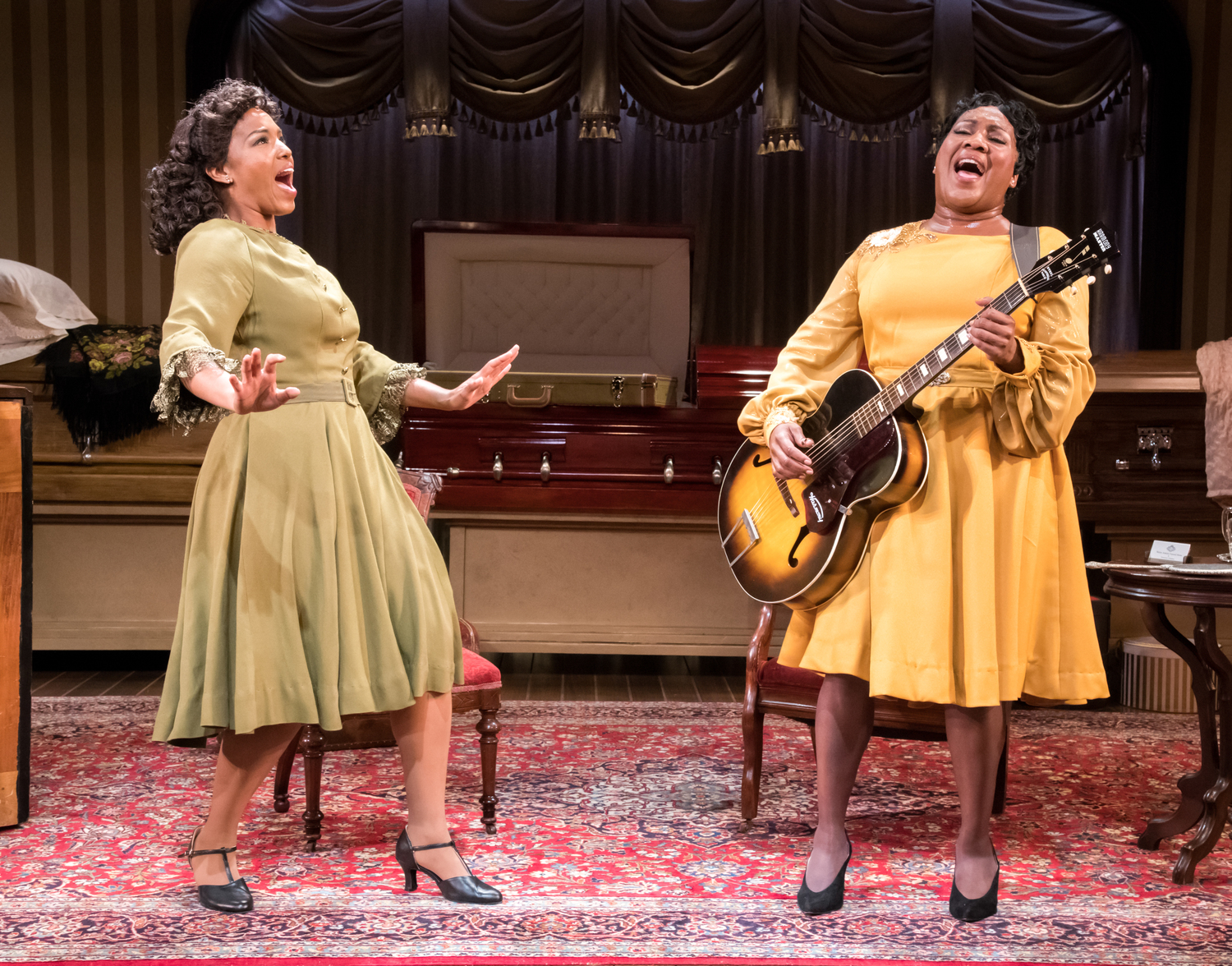Review: MARIE AND ROSETTA at Mosaic Theater Company

Rock and roll is a cornerstone of American culture - Elvis, Johnny Cash, and Little Richard are all household names across the country. And yet, the names of the women who pioneered the genre are largely unknown, as are their stories.
"Marie and Rosetta," which opened Mosaic Theater's fourth season, seeks to change that. It tells the story of the night Sister Rosetta Tharpe and Marie Knight formed their famed partnership and changed musical history. Throughout the course of the show, the women open up to each other about their families, their romantic relationships, their faith, and their music, and form the bond that provides the foundation for their short but influential collaboration. The play, written by George Brant, was originally staged in New York, with subsequent performances in Cincinnati and Cleveland; Mosaic marks the show's DC-area premiere.
"Marie and Rosetta" is, of course, centered around the music the two popularized, and features a number of musical interludes that even those who (like myself) entered the show unfamiliar to gospel will immensely enjoy. The actresses are accompanied by their respective musical counterparts - a guitar for Rosetta, and a piano for Marie. In a unique twist on previous productions, director Sandra L. Holloway elected to place musicians on stage with the actresses, and, with the assistance of musical director e'Marcus Harper-Short, brings them into the show. The musicians serve as an extension of the actresses on stage, interacting with their respective characters in a way that bares their mindsets for the audience. This interplay is a striking and effective approach - while there are often shows that feature musical accompanists onstage, or performers who are also musicians, this positioning was fresh and impactful, and gave the added benefit of allowing the actresses to move around the stage without losing their characters' musicality. Guitarist Barbara Roy Gaskins skillfully channels Rosetta's humor and passion for music, while pianist Ronnette F. Harrison gives the audiences peeks into both characters through delightful facial expressions and an impressive segment in which she portrays both characters playing together.
As the titular characters, Ayana Reed (Marie) and Roz White (Rosetta) impressively embody the legendary pairing. From the opening lines, White steals the spotlight with Rosetta's bold humor and talent, but still conveys a sensitivity that glimmers just below the brash surface. Rosetta, for all of her hip-swinging and secular twists on gospel, is still a church girl worried about how she is perceived by her fellows, and no amount of fame or armor will fully protect her against being a black woman in the 1940s South. White balances these vulnerabilities into a character full of bombast and optimism, and the result is an enthralling lead.
Reed's Marie is much more subtle, but perhaps even more powerful for it. While Rosetta's grandiosity draws the audience's attention, Marie quietly grows throughout the show, starting as a shy and enthusiastic fan, then a woman capable of pushing back and even sparring with her mentor, then finally as a powerful performer in her own right who is able to collaborate with Rosetta. Although Rosetta is the focus of the action, it is Marie who directs most of the show's heart, particularly the emotional ending. Rosetta may own the stage, but Marie blooms on it. And that combination makes it all more fascinating to watch.
Although there are a few religious and musical references that may escape the uninformed (I personally needed to look up "seventy times seven"), the show itself is a spiritual experience. It's impossible not to feel enraptured when the women on stage start singing and playing, but the discussions they have as they learn about each other and philosophize about life itself are incredibly compelling. Although the show handles heavy topics - faith, fate, domestic violence, racism, loss - it, like its subjects, never takes itself too seriously. There are laughing apologies anytime they use the word "damn" out of respect for their temporary practice space, which is a funeral home, and tongue-in-cheek references to many of their darker experiences. But the levity makes the performance all the more powerful - it draws the audience in, allows them to connect more deeply, and the bond between the women onstage is felt more keenly as a result.
At its core, "Marie and Rosetta" is a celebration of an incredible friendship between two extraordinary women, and seeks to give them long overdue credit for their contributions to music. Just this past December, Tharpe was elected to the Rock and Roll Hall of Fame as an Early Influence - it's fitting to see her story be recognized as well.
Mosaic Theater Company's production of "Marie and Rosetta" plays at the Atlas Performing Arts Center through September 30th. Free post-show discussions are featured on Thursdays, Saturdays, and Sundays - the full list can be found on the show's site: https://www.mosaictheater.org/marie-and-rosetta. The performance run time is 100 minutes.
Photograph by Stan Barouh, featuring Ayana Reed (left) and Roz White (right).
Reader Reviews

Videos

